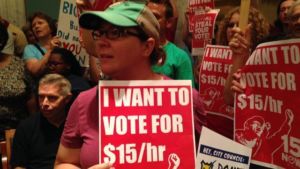Minneapolis on the Brink From Leftward Lurch
Minneapolis faces a crisis that’s only going to get worse under current leadership. That meme comes up a lot lately in regards to the city’s police. Yet a key civic leader sees the biggest threat to city residents coming not from the officers on the street but from the increasingly left wing loonies in and running for city council and mayor in “the most consequential municipal election in many years.”
Steve Cramer, a former Minneapolis City Councilor and CEO of the Minneapolis Downtown Council, warns in the Star Tribune that the city faces potentially dire consequences from the onslaught of liberal activists vying to be on the ballot this fall.
Some aspiring Minneapolis politicians believe success requires fealty to an agenda that has little to do with actually running municipal government, and everything to do with bringing a left-of-mainstream vision for the city into reality.
This agenda is determined by a small group of activists who have outsized influence over a process involving only a narrow slice of the population as participants.
Cramer’s wake-up call should be must-reading for Minneapolis residents, especially the two-thirds of the electorate who failed to vote in the 2013 citywide election. He cautions that the current “command-and-control” mandates in fashion with city elected officials will backfire on City Hall and hurt lower-income workers, businesses and the local economy.
Employers will respond as they must for their own viability — by cutting employee hours, looking for more qualified workers and adopting business practices that are less labor-intensive.
The city’s new policies will only hurt the lowest-earning workers, who most need chances for economic advancement. A better solution is to invest in these members of our community, through workforce partnerships involving community organizations, educational institutions and employers in need of prepared workers. And at the same time, encourage rather than inhibit job growth.
The debate so far has been one-sided in favor of “City Hall knows best.” I hope this important discussion will deepen and ultimately take a different direction. If not, the landscape for neighborhood-scale commerce, in particular, will change for the worse in coming years. And that will translate into less opportunity for the folks who need it most.
Cramer notes that almost all city councilors were challenged this year by even more radical activists for endorsement, “despite records at City Hall that would be the envy of progressive advocates anywhere else.” But what are the chances the candidates will embrace Cramer’s plea to focus on the core functions necessary to operating a city or opt for more social activism?
Local government doesn’t solve the world’s problems. Anyone running on that platform is aspiring to hold the wrong office. City Hall does address the day-in, day-out street-level solutions that allow neighborhoods and their residents, and commercial districts and their businesses, to thrive. This set of responsibilities is broad and challenging enough, as is determining the proper level of property taxation for a suite of essential city functions. Most important, constituent services are the bread-and-butter responsibility of municipal officeholders.
He calls on more mainstream Minneapolis residents to prevent a city council that’s already “by any measure is among the most left-leaning in the nation” from lurching even further leftward. At the same time, Cramer acknowledges the “loudest voices in the room” have dominated the process so far.